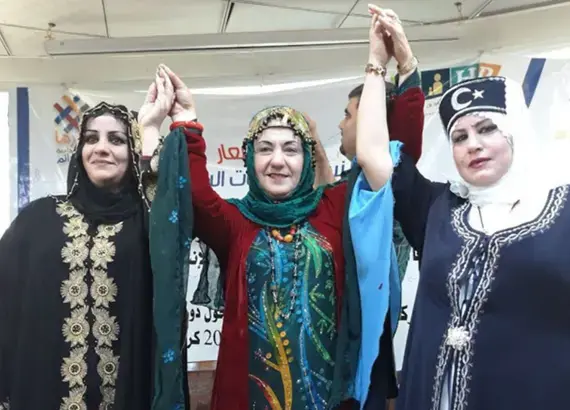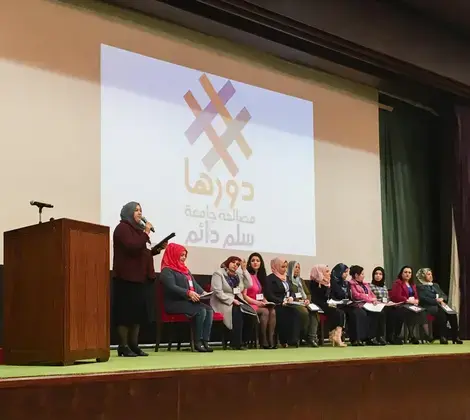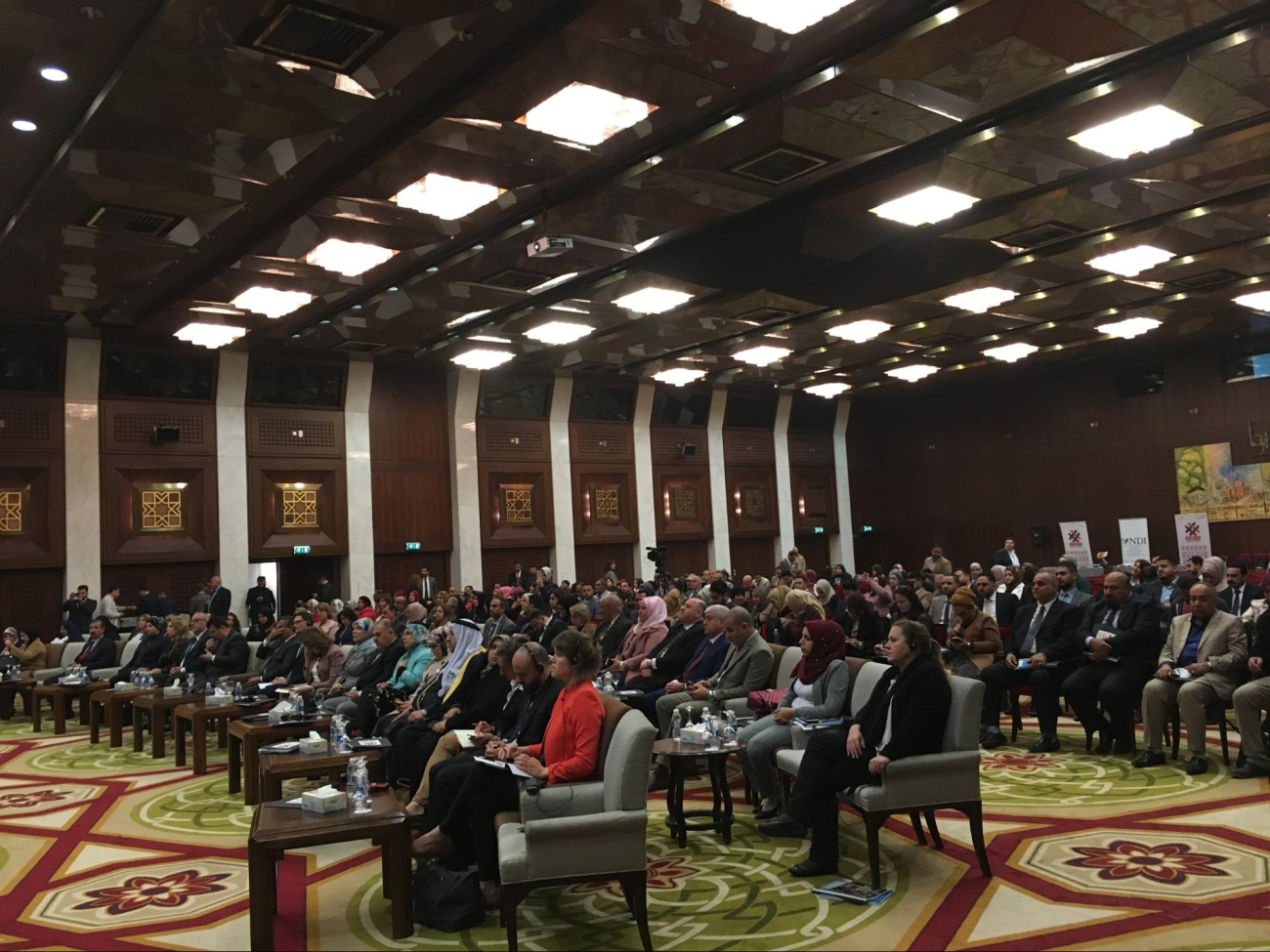
Three of the 40 women who participated in NDI’s programs to support Iraqi women peace advocates lead an outreach event in Kirkuk. They wear the traditional religious or cultural attire of their sects to demonstrate solidarity with their communities and hold hands to represent their work to build bridges across ethno-sectarian divides.
Success Story
Iraqi Women Lead Peace and Reconciliation Campaign, Bridging Sectarian Divides

At the Women in Peacebuilding Symposium on December 5, women peace advocates share their ideas with over 200 decision makers from the government, civil society, and international organizations.
A group of Iraqi women peace activists stood together this month to urge the government of Iraq and the international community to engage in open and honest dialogue on national reconciliation. With support from NDI, they convened the Women in Peacebuilding Symposium on December 5 to share their ideas, bringing together over 200 decision makers from the government, civil society, and international organizations. The 40 women, despite coming from ethnically and geographically diverse backgrounds, joined together to present a united vision for reconciliation in Iraq and a step-by-step, research-based strategy on how to implement it. In a country where the focus remains on the challenges that led to conflict, these women are leading an effort to refocus on solutions.
Just a year after the defeat of the Islamic State of Iraq and Syria (ISIS), such a gathering of women collaboratively leading peacebuilding efforts in Iraq could be hard to believe. Many women who lived under the occupation of ISIS do not see themselves as victims. Instead, their experiences in the recent conflict have helped to position them as key players to build bridges across ethno-sectarian divides. Differing in background but unified in purpose, these activists show that, as one woman put it, “every citizen has a role to play in peacebuilding.”
To get to this point, these women had to overcome the obstacles presented to them by a male-dominated political environment, as well as learn to navigate complex post-conflict dynamics. In the fall of 2017, NDI launched a pilot program funded by the government of Canada to build the capacity, confidence, and connections of 40 women peace activists from the ISIS–liberated provinces of Anbar, Kirkuk, Ninewa and Salahaddin. The Institute assisted these women as they built their public profiles and enhanced their credibility as capable and well-informed activists. Rather than creating a parallel structure to mirror the more male-dominated reconciliation mechanisms, the women sought to contribute to and strengthen existing reconciliation structures. Many were justifiably apprehensive to engage with male political leadership, particularly after years under ISIS control.
In Iraq, women fear men and having discussions with them, particularly men in government. But today, I now have the confidence to meet with anyone and engage them in a constructive dialogue.
– Salahaddin participant
However, many of the women have overcome an initial sense of apprehension and started to recognize their power and authority to drive change. Utilizing negotiation and facilitation techniques learned from NDI trainings, these women activists have become advisors and subject-matter experts on reconciliation projects across Iraq.
The women drafted A Strategy for Peace in a Iraq: A Gender-Sensitive National Reconciliation Platform, a comprehensive policy document that they are now promoting to decision-makers across the country. They have held over 880 meetings with community leaders and gathered the input and generated buy-in from an estimated 7,400 citizens. With each of these meetings, the participants have gradually carved out political space for themselves. Many are now using their newfound power to increase opportunities for other Iraqi women to engage in the reconciliation process.
The power of these women activists is derived in part from learning how to work together in an environment that often atomizes individuals based on sect or ethnicity. Many of the 40 activists who were brought together for NDI trainings had never engaged in discussions with those outside their province. A Yazidi woman remarked that she was concerned that fellow participants were potential terrorists; conversely, a Sunni woman was embarrassed to present herself as a peace activist, knowing that she may not be taken seriously because members of her sect have been vilified and corrupted by ISIS.
We were separated for a long time but through you [NDI] we were able to come together. You [NDI] brought the organizations, the women, and the friendship back across provinces.
– A participant from Salahaddin
Despite their initial trepidation, the women later reported appreciating NDI’s workshops and the cross-sectarian empathy that they fostered. They noted that, in order to advance the process of peacebuilding, they need to be able to understand and articulate the perspectives of others. Many of the women have taken great care to invite all sects and ethnicities in their communities to their presentations on their national platform for peace.
Together, the activists continue to prove the valuable contribution that women can have in advancing reconciliation in Iraq. NDI plans to continue to support these women activists as they promote their roadmap for peace and assert the necessity of women’s inclusion and leadership in peacebuilding.
This program is implemented with funding from the Government of Canada, Peace and Stabilization Operations Program (PSOP).
Related Posts




